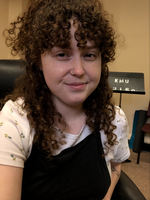Few area arts presenters can rival the intimacy and charm found in Inez, in Warren County, where for over a decade Edgar Thorne has hosted in his family home a fine series of chamber music concerts. From the capital, the drive takes a bit over an hour. The house is laid out in the fashion of southern homes of the time, which means that there is a central hall, flanked by two large rooms or parlors. For concerts, the piano–a fine Steinway grand–is placed along one of the hallway walls, with the keyboardist positioned so he (or she) may be seen from the adjoining rooms. A large stairway to the second floor fills the opposite side of the hall, and many listeners find the steps ideal perches for the concerts. Others sit in the parlors, where some may see the artists and all may hear them clearly.
About 40 people were on hand on the afternoon of December 2 for an admirable recital of German songs, given by soprano Marilyn Taylor and pianist Clifton Matthews. Like many artists who have visited Cherry Hill in the past, Taylor must have thought she was in a truly remote place that is devoid of culture, but the people who attend these programs are remarkably sophisticated, and they proved unusually attentive on this occasion. The recital began with four fine Schubert songs, followed by Schumann’s “Fraunenliebe und -Leben.” After the intermission, another Schubert group–four songs and the Romanze from Rosamunde–were performed. The grand finale was Zemlinsky’s short group of six Waltz-Songs, and the single encore was Schubert’s “Seligkeit.”
The opening group began with “An die Musik” and ended with “Gretchen am Spinnrade.” Texts and translations were provided, and the song sheets were nicely laid out, although the spell-checker apparently didn’t know German very well. The poets were all credited, but Deutsch’s catalog numbers were not provided. Generally speaking, these are more useful than the opus numbers that were in some cases given, for the catalog numbers are arrayed in more or less chronological order while the opus numbers generally reflect the order of publication. There were no program notes, but Taylor offered brief comments at two points.
Matthews, whom some of us recall from his years at UNC, is a superb pianist and–rarer still–a matchless accompanist. He infused his contributions with passion, fire, delicacy and charm, as appropriate to the music. He was as well an outstanding partner who never once inundated the singer, but he soared when he had the stage to himself, in preludes, interludes and postludes. Taylor has a marvelous, light voice that she uses with great artistic skill and insight. At Cherry Hill, which is a small and intimate place, it was never necessary for her to press too hard, so her performances were throughout relaxed and gentle. There was plenty of fire where the texts and the music required it. Her interpretation of the Schumann had a lot going for it; the wide-ranging emotions the cycle explores were brought to life in all the right ways, so we felt both joy and despair during its course. The second Schubert group seemed even better than the first, thanks in part to Taylor’s inclusion of the wonderful Rosamunde song. In “Die junge Nonne,” Taylor placed her black shawl over her head–her only touch of overt theatricality during an otherwise restrained performance.
Taylor explained that Zemlinksy’s charming songs sound a bit like Richard Strauss, and that’s true, for many suggest the famous waltzes in Der Rosenkavalier. They also hint at the Waltz King’s work, too – pieces by Johann Strauss II and his family. But Zemlinsky’s vocal lines more nearly resemble those created by Richard Strauss, whose writing for women’s voices has never been surpassed. Taylor didn’t mention Zemlinsky’s relationship to Schoenberg–they were brothers-in-law–but many early works by the atonal master are richly romantic, and the Waltz-Songs are, too. Like the rest of the program, these were delivered with great skill and high levels of involvement on the parts of the visitors. The audience’s enthusiastic response led to a single encore, “Seligkeit,” D.433, which was likewise radiantly realized.
After the performance, the artists and the audience enjoyed refreshments and mingled. As is often the case at Cherry Hill, many people lingered after the concert to enjoy the fellowship and conversations.











